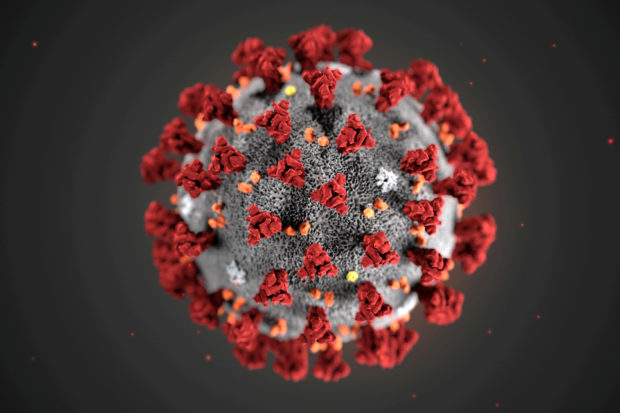Childhood vaccine may help prevent severe COVID-19

FILE PHOTO: The ultrastructural morphology exhibited by the 2019 Novel Coronavirus (2019-nCoV), which was identified as the cause of an outbreak of respiratory illness first detected in Wuhan, China, is seen in an illustration released by the Centers for Disease Control and Prevention (CDC) in Atlanta, Georgia, U.S. January 29, 2020. Alissa Eckert, MS; Dan Higgins, MAM/CDC/Handout via REUTERS.
People whose immune systems responded strongly to a measles-mumps-rubella (MMR) vaccine may be less likely to become severely ill if they are infected with the new coronavirus, new data suggest.
The MMR II vaccine, manufactured by Merck and licensed in 1979, works by triggering the immune system to produce antibodies.
Researchers reported on Friday in mBio that among 50 COVID-19 patients under the age of 42 who had received the MMR II as children, the higher their titers — or levels — of so-called IgG antibodies produced by the vaccine and directed against the mumps virus in particular, the less severe their symptoms.
People with the highest mumps antibody titers had asymptomatic COVID-19.
More research is needed to prove the vaccine prevents severe COVID-19. Still, the new findings “may explain why children have a much lower COVID-19 case rate than adults, as well as a much lower death rate,” coauthor Jeffrey Gold, president of World Organization, in Watkinsville, Georgia, said in a statement.
Article continues after this advertisement“The majority of children get their first MMR vaccination around 12 to 15 months of age and a second one from 4 to 6 years of age.”
Article continues after this advertisementSmoking increases cell vulnerability to COVID-19
UCLA researchers also found that exposure to cigarette smoke makes airway cells more vulnerable to infection with the new coronavirus.
They obtained airway-lining cells from five individuals without COVID-19 and exposed some of the cells to cigarette smoke in test tubes. Then they exposed all the cells to the coronavirus.
Compared to cells not exposed to the smoke, smoke-exposed cells were two- or even three-times more likely to become infected with the virus, the researchers reported on Tuesday in Cell Stem Cell.
Analysis of individual airway cells showed the cigarette smoke reduced the immune response to the virus.
“If you think of the airways like the high walls that protect a castle, smoking cigarettes is like creating holes in these walls,” coauthor Brigitte Gomperts told Reuters. “Smoking reduces the natural defenses and this allows the virus to enter and take over the cells.”
Cells infected with new coronavirus die
Cells infected with the new coronavirus die within a day or two, and researchers have found a way to see what the virus is doing to them.
By integrating multiple imaging techniques, they saw the virus create “virus-copying factories” in cells that look like clusters of balloons.
The virus also disrupts cellular systems responsible for secreting substances, the researchers reported on Tuesday in Cell Host & Microbe.
Furthermore, it reorganizes the “cytoskeleton,” which gives cells their shape and “serves like a railway system to allow the transport of various cargos inside the cell,” coauthor Dr. Ralf Bartenschlager of the University of Heidelberg, Germany told Reuters.
When his team added drugs that affect the cytoskeleton, the virus had trouble making copies of itself, “which indicates to us that the virus needs to reorganize the cytoskeleton in order to replicate with high efficiency,” Bartenschlager said.
“We now have a much better idea how SARS-CoV-2 changes the intracellular architecture of the infected cell and this will help us to understand why the cells are dying so quickly.”
The Zika virus causes similar cell changes, he said, so it might be possible to develop drugs for COVID-19 that also work against other viruses.
For more news about the novel coronavirus click here.
What you need to know about Coronavirus.
For more information on COVID-19, call the DOH Hotline: (02) 86517800 local 1149/1150.
The Inquirer Foundation supports our healthcare frontliners and is still accepting cash donations to be deposited at Banco de Oro (BDO) current account #007960018860 or donate through PayMaya using this link.